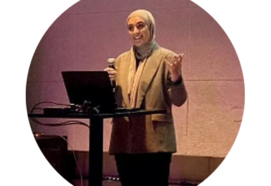This free webinar was organised by ACAMH’s Adverse Childhood Experiences (ACEs) Special Interest Group Monthly seminars.
This webinar ‘Interrelationships between parental mental health, intimate partner violence and child mental health – implications for practice’ was led by Prof. Gene Feder, Dr. Shabeer Syed, and Dr. Claire Powell on behalf of the NIHR Children and Families Policy Research Unit.
ACAMH Members can receive a CPD certificate, simply email and let us know the date and time that you watched the recording.
Slides
Dr. Shabeer Syed – Family adversity and health indicators for identifying and responding to IPV
Dr. Claire Powell – Co-ordinating support for families experiencing IPV and mental health outcomes
Professor Gene Feder – Synthesis of findings and clinical implications
About the webinar
The project team will present findings from a mixed methods study that seeks to improve responses to families affected by intimate partner violence (IPV) and parents and children’s mental health problems. First, we will report findings from analyses of the Avon Longitudinal Study of Parents and Children (ALSPAC) cohort that confirms strong links between IPV and parental mental health before the child turns nine years and poor mental health reported by the child at age 18.
Then, we will present preliminary findings on the relationship between parental IPV and a range of clinically relevant adversity and mental health-related indicators (www.acesinehrs.com) in anonymised health records from parents and children presenting to GPs, A&E and hospital admissions between one year before and five years after birth. We show that more than 1 in 2 (53.4%) families had at least one recorded ACE in the early life course, although only 1 in 40 (2.5%) families had recorded parental IPV. Compared to families without ACEs, families with ACEs had a much higher risk of parental IPV, especially when at least one parent and child had recorded a mental health problem.
In three English local authorities, we have conducted qualitative case studies of how practitioners in primary care, Child and Adolescent Mental Health Services (CAMHS) and specialist domestic abuse services respond to families experiencing IPV and mental health concerns. We have found a range of barriers to multi-agency working, including children’s exposure to IPV not being recognised by general practice and CAMHS clinicians. Whilst there were good examples of cross-service working to support families, there was a weakness in the relationship between specialist CAMHS and domestic abuse services. Children still living with or in contact with the perpetrator faced a particular gap in mental health service provision.
Relevance to practice – The association of parents and children’s mental health problems with IPV requires a low threshold for asking about parental mental health and exposure to IPV within general practice when seeing children routinely, and particularly when seeing children with emotional or behavioural problems. Within CAMHS, we need improved training in recognising and appropriately responding to current or past IPV. For children exposed to IPV or other forms of child maltreatment falling below CAMHS (or children’s social care) thresholds, we will discuss support and referral within primary care to address mental health needs.
About the speakers
Professor Gene Feder is a GP in Bristol and Professor of Primary Care at the University of Bristol. His research started with a doctoral thesis on the health and health care of the traveller community. He has expertise in cardiovascular health, in particular the diagnosis and management of angina and using cardiovascular risk as a basis of treatment decisions. He also is an expert on domestic violence, in particular the response of health care professionals to survivors of partner abuse. His expertise in clinical guidelines and quality of health care has focused on the validity of guidelines and their implementation in primary care. He has chaired four UK national guideline development groups.
Dr. Shabeer Syed – I am a Clinical Psychologist and an Epidemiologist. I work clinically in child and adolescent mental health services (CAMHS). My research focuses on adverse childhood experiences (ACEs) and improving the health of vulnerable families across the early life course. I am a Senior Research Associate, NIHR Children and Families Policy Research Unit, UCL Great Ormond Street Institute of Child Health.
Dr. Claire Powell – I am a qualitative health researcher with a focus on families living in adversity and the services they might access. Previous work has involved mothers in prison, mothers with perinatal mental health problems, and adult survivors of child maltreatment and domestic abuse, as well as health and social care professionals. I have experience in a range of methods including qualitative, consensus, and evidence review. I am interested in how health policy and practice can be improved to reach more families and avoid causing harm, particularly for survivors of violence and abuse. In my current role in the NIHR Children and Families Policy Research Unit, I work across a broad range of projects including domestic abuse and early years service provision, young people’s access to primary care and the school experiences of young people with chronic health conditions. I particularly value working in partnership with third-sector organisations and ensuring the voice of lived experience is listened to and acted on throughout the research process.


